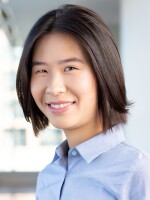
Huo Jingnan
Huo Jingnan (she/her) is an assistant producer on NPR's investigations team.
She works with journalists in the network and in member stations to produce original, in-depth reporting. She looked into and investigated .
She was the primary data reporter on , a project investigating black lung disease's resurgence. The project won an Edward Murrow Award and NASEM Communications award, and was nominated for an Emmy Award and a George Foster Peabody award.
Huo has a master's degree in journalism from Northwestern University in
Evanston, Illinois and a bachelor's degree in law from Southwest University of
Political Science and Law in Chongqing, China.
-
Research conducted at the height of the 2020 election reveals new details about how Facebook's algorithms handle political content. But it suggests there are no easy fixes to political polarization.
-
Recent research shows how generative AI could make effective and cost efficient propaganda. It's difficult to detect AI-generated text, raising concerns about the 2024 election.
-
The conspiracy theory alleges that a shadowy global elite conspires to control the world's population, in part by forcing them to eat insects. It's being cited by politicians in several countries.
-
A conspiracy theory that claims governments are trying to enslave people and force them to eat bugs has made the leap from online message boards to national politics in at least two countries.
-
For people who have family members on different sides of the war in Ukraine, it's been a long year of disagreeing, disbelieving and biting tongues.
-
For those with families in both Russia and Ukraine, talking about what's happening on the ground in Ukraine has become a challenge.
-
Twitter will start charging users for downloading and uploading data. Everything from bots giving out earthquake alerts to ambitious research about how misinformation spreads could be affected.
-
As China lifts its stringent zero-COVID policy, public health messaging has taken a U-turn. People are grappling with the whiplash, trying to find a way to protect themselves and loved ones.
-
Researchers noticed accounts spewing out suggestive images. Some observers wondered if it was a Chinese government tactic to drown out the news, but the reality appears to be more complicated.
-
So far, false claims of voting malfeasance have not incited the chaos that many had feared would ensue, stoked by a mythos of election fraud that's become a core belief for many on the right.








